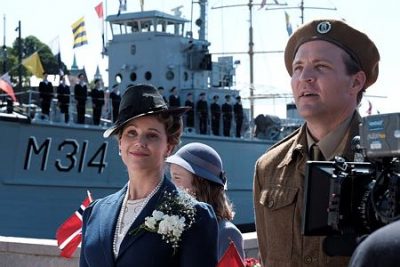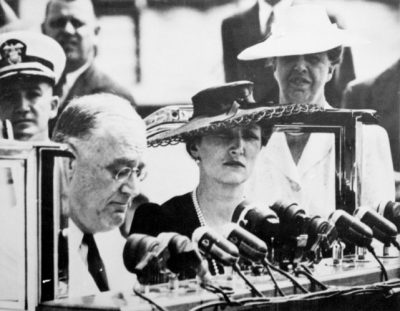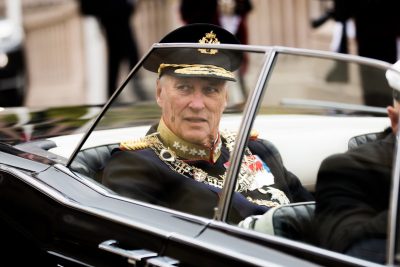Norwegian Broadcasting (NRK) has confirmed that its dramatization of Crown Princess Martha’s role during World War II is “mostly fiction.” The NRK series Atlantic Crossing has now been aired on PBS’ venerable Masterpiece Theater in the US, where hundreds of thousands of Norwegian-Americans may not be aware that it’s far from being factually correct.

When the series debuted on NRK in Norway last fall, there was so much uproar over the artistic license taken by its producers that the state broadcaster published a fact-checker on its website after each episode. The idea was to clarify what was fact, what was fiction and what was simply embellished, as Atlantic Crossing’s take on Martha’s and her royal Norwegian children’s wartime exile in the US unfolded. They’d all been invited to be US President Franklin Roosevelt’s “special guests” and under his personal protection after the Nazi German invasion of Norway on April 9, 1940.
NRK later had to admit, however, that even its fact-checking left much to be desired. After weeks of controversy and harsh criticism of the series’ content from Norwegian historians and royal biographers, NRK’s drama chief Ivar Køhn was confronted on the network’s own popular debate program Debatten in December. Asked what was fact and what was fiction, he conceded that “we view this series as pure fiction.”
It’s “inspired” by real events, a qualification that PBS itself has duly noted in its promotion of the series in the US (external link). “What ‘inspired by true events’ really means is (that) some of it is made up,” Atlantic Crossing‘s director Alexander Eik is quoted as having said on PBS’ own website. Eik cited a “delicate balancing act between staying true to history and at the same time creating a compelling dramatization, and not least to be respectful to the subjects, many of whom are still alive today.” He noted that the “main challenge” in creating the series “was to imagine what went on behind closed doors.”

His comments on PBS come after respected Norwegian historians including Tore Rem and Tor Bomann-Larsen have utterly panned the series and accused its creators of all but telling lies. Bomann-Larsen has also called the series “chauvinistic” for portraying Martha and Norway itself as having much more influence over Roosevelt than either actually had. Rumours have swirled for years that they had a romantic relationship, and that’s what’s widely viewed in Norway as motivating the series’ creation in the first place. While most historians and family members have dismissed the rumours, the series plays heavily on them. Even though Eik claims that the series’ creators and writers spent nearly seven years “researching all sides of the events depicted in the series, as well as the personalities of the characters involved,” Bomann-Larsen (who’s written a series of books about Norway’s royal family) has written it off as “fake history.”
Other critics have been nearly as brutal, including Erling Lorentzen, one of those who lived through the war years and was indeed still alive last fall when the series debuted in Norway. Lortenzen, who died in March, was a Norwegian war hero who later served as a royal guard and married Crown Princess Martha’s oldest daughter, Princess Ragnhild. Lorentzen was so upset by the series that he wrote a scathing letter to the editor of Norway’s biggest newspaper Aftenposten in December, calling the series a “a deeply false impression of history.” He worried that viewers would think the series was based on historic realities. He claimed it’s “full of lies,” especially in its portrayal of the crown princess as having unusual access to, and influence over, Roosevelt and even changing the course of history.

“For someone who took part in the war and was close to members of the Royal Family, the result (of the series) … is directly grotesque,” wrote Lorentzen. He noted that the royals themselves can’t express their opinions, and there hasn’t been any comment on the series from his brother-in-law King Harald, who spent much of his childhood in the Washington area, or the Royal Palace. “When I choose to express my opinion,” Lorentzen continued, “it’s because I was close to some of those whose lives have now been used in a commercial context. Such speculative exploitation of defenseless people in the name of entertainment is nothing less than shameful.”
That was harsh criticism from the then-97-year-old Lorentzen who’d emigrated to Brazil with Princess Ragnhild right after their wedding in 1953 but died back home in Norway last month. The series created such a fuss that complaints about it were also filed with Norway’s broadcasting council (Kringkastingsrådet), where they were upheld.
Eik has consistently defended the series, claiming that Bomann-Larsen had been invited to contribute his own research to the series but declined to do so, suggesting Bomann-Larsen had his own agenda and won’t accept other historical angles. Eik also dismissed the criticism from historians Tore Rem, who’s just published new books about the royals, and Tom Kristiansen, a professor at the University of Tromsø, claiming in newspaper Aftenposten last December that they just wanted “their share of pre-Christmas attention.” Eik wrote in his own response to all the criticism that he and his crew had never claimed their series represented “the truth about our royals during the war.” He leaned heavily on the “fact checkers” published by NRK after each episode aired, claiming that most Norwegian viewers were “smart enough” to understand what was fact and what was fiction. That was before NRK admitted that it didn’t hire in historians to do the fact-checking or “control the truths” presented in the series.
Eik stressed that the late King Haakon (father of Martha’s husband, Crown Prince Olav) awarded her a high military decoration for her “contribution for Norway” during the war. Eik also defended his interpretation of the close relationship between the crown princess and Roosevelt during the war. “No one knows the full truth about what happened 80 years ago, so don’t tell us about the (apparently jealous) crown prince’s feelings either,” Eik and the series’ historical collaborator Linda May Kallestein wrote in an angry commentary in Aftenposten directed at their critics. “The truth is that you know very little about it either.”
The difference between his team and the historians, Eik insisted, is that they work with drama and thus have “a license to make up what we believe are probable or at least not improbable scenarios. Modern TV audiences have no problems understanding that.”
‘Belly flop’ in ‘deep water’
Other critics didn’t entirely agree, with newspaper Dag og Tid branding the series as “A belly flop across the dam” and Dagsavisen calling it “A war drama in deep water.” When the series was aired in Denmark last month, critics didn’t seem to care as much about its historic accuracy. “The problem is that it’s bad fiction,” wrote critic Lone Nikolajsen.
Swedish reviews were also less than raving when the series was aired in Sweden in February, complaining that the Swedes were portrayed in a bad light. Crown Princess Martha was, after all, a Swedish princess before she married Norway’s heir to the throne. She had initially fled with the royal children to Sweden right after the invasion, while her father-in-law and husband dodged the Nazis by heading north before ultimately escaping to London, where the Norwegian government went into exile and never officially surrendered to Hitler.
The neutral Swedes, meanwhile, viewed Martha as a liability and there also were fears her three-year-old son Prince Harald would be sent by Swedish King Gustav V at the time back to occupied Oslo. When Roosevelt sent his offer of refuge in the US, though, Martha resisted, according to letters and members of her entourage at the time. Even though she wanted to stay in Sweden, “Norwegians will always portray their own as war heroes and the Swedes as cowards,” claimed Swedish royal expert and historian Herman Lindqvist.
Ivar Køhn, the drama chief at NRK, has claimed that viewers “must accept that there’s a fictional grip in historic drama series.” After being accused by historian Bomann-Larsen that the series’ producers “cheated” NRK, otherwise known as a credible provider of news and documentaries, Kohn was asked whether he regretted that the series wasn’t more clearly described as fictional.
“We view it first and foremost as drama,” Køhn said on the NRK debate program. “The historic discussion can gladly continue among historians.”
NewsInEnglish.no/Nina Berglund

